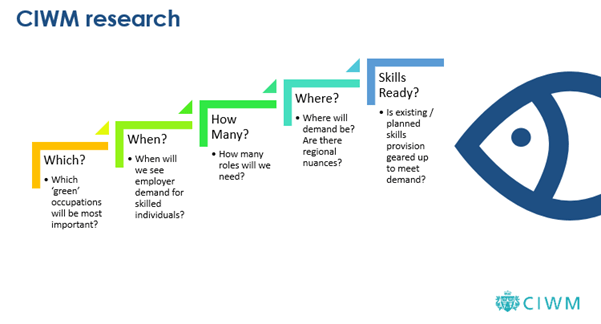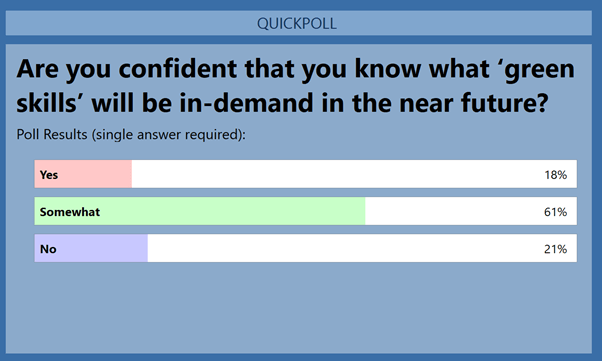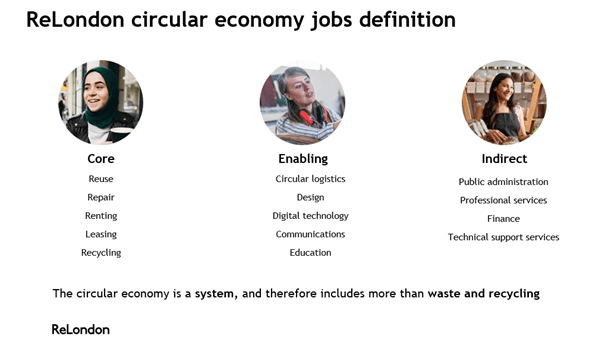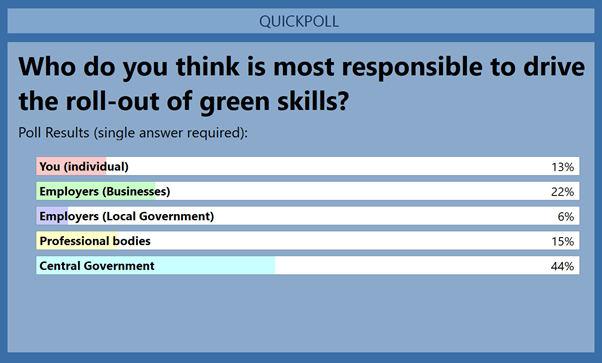Are we ready for the green jobs revolution?
24th November 2022
By Siobhan O’Dell, Community Liaison Manager at SUEZ recycling and recovery UK
As we move towards the end of 2022, it is the ideal time to reflect on the year just passed and to look ahead to what the future might hold for us as a sector. In a SUEZ hosted webinar earlier this week, our External Affairs Director, Dr Adam Read, turned his attention to the skills needed for the UK to go ‘green’ asking some fundamental questions about the green skills opportunities and needs of a more circular and low carbon economy.
We were hoping the expert panel could help us answer these fundamental questions:
- How many jobs are there in the likely green transition as we look to decarbonise the UK?
- What does the green economy look like and what are the skills and competences most in need to make it a reality?
- What is the role of waste and resources sector in this transition?
- And ultimately are we, as a sector, as professionals, as individuals, ready for the revolution?
The first expert panellist was Sarahjane Widdowson, Director of Intelisos and co-author of the CIWM 2021 presidential report, Skills for the future: the journey to 2030. The green skills agenda is a core theme for the CIWM and a real passion for the webinar chair (and immediate CIWM past president) and the report’s author who are now both active in the CIWM skills for the future working group.
Sarahjane shared some of the initial findings from a live research project that the CIWM are undertaking to develop a fuller understanding the of the sector’s likely evolution to low carbon and more circular solutions. The research also looks at what this will mean in terms of jobs, skills, and training. This will be vital for both the sector and the organisations within it as they plan for the transition, through recruitment, training, and innovation. The UK Government and the devolved administrations are also acutely aware of the need to support key sectors in their green transitions.
The CIWM project is being shaped by the demands of UK Government departments, like DEFRA, BEIS, DfE and DWP who are keen to better appreciate how different sectors will evolve, what demand for skills will develop while greening these sectors, and whether we will have the capacity we need.
The CIWM believes there are five fundamental questions that need to be answered:

By collecting data on these five key pillars, we can understand the true scope of the circular economy and the best ways to prepare for future demands. However, it was clear from the early banter on the webinar that definitions of green jobs in the circular economy vary significantly making it hard to know just which projection for jobs and skills is most likely!
Adam asked the audience how confident they are that they understand what skills are needed in a green future and the results were perhaps as expected. Most of the audience, 61%, were uncertain of the skills required. This uncertainty makes it hard for industry bodies and employers to know what training programmes to develop. The audience’s uncertainty set the tone for the rest of the panel debate and highlighted the need for CIWM and other organisations to continue working to build future projections with real substance.
Poll #1 results:

One of the most urgent needs for our sector is securing the talent we need both to deliver immediate business needs and to get us started on the green transition. Sarahjane explained that new data from a recent CIWM members survey suggests that the waste management sector has struggled with recruitment over the last year, with 60% of respondents reporting real issues. Roles that have difficult to fill have varied from front line workers to specialist technical support roles and project managers. Moving forwards the sector needs to work out how we can fill these positions, but more importantly how it can attract young people into these careers rather than the current model of people ‘falling into’ the waste sector. Challenging perceptions, supporting teaching in primary and high schools as well as improved wages could all play a part in ‘rebranding’ the industry. From the most recent survey the three most required skills identified as areas of real growth were project management, data analysis and communications – a wide ranging skill set that is often overlooked by young people and which aren’t often considered core to our sector.
Keith James, Head of Policy and Insights at WRAP, joined the panel to share his experiences at COP27 where there was a heightened interest in the role of the circular economy in delivering decarbonisation and WRAP’s work on developing jobs in the circular economy. He highlighted that many different organisations are using different modelling tools to support their projections for green jobs, but all the models predict huge growth and opportunities UK wide. Opportunities range from low to highly skilled jobs, with a particular emphasis on mid-level jobs which have reduced over the last 20 years due to decline in the UK manufacturing industry. This projected growth will help to deliver decarbonisation, reduce unemployment and drive economic growth, a real win-win situation!
WRAP first started looking at job opportunities in the circular economy over 10 years ago and in 2015 collaborated with the Green Alliance, extending this work to look at how the circular economy could reduce unemployment and drive economic growth. In 2021, WRAP reviewed the progress made in this area and found that their initial predictions from 2015 were still in line with their estimates for over 560,000 jobs in the UK circular economy, adding approximately £40 billion to the UK economy. This increase has happened organically through businesses taking the lead and innovating solutions themselves, rather than through policy change.
Keith suggested that planned policy changes which will enable a faster and more expansive roll-out of circular solutions could positively impact the growth trajectory, potentially doubling job opportunities by 2030. This acceleration would create demand for another 550,000 green jobs with a gross value added of over 80 billion to the UK economy, all whilst reducing greenhouse gas emission by 30 million tonnes a year. These numbers are huge and almost incomprehensible, but they suggest that there is a real opportunity here for Government to maximise the potential of going green sooner rather than later.
However, in discussion with the audience it became clear that there are limitations with recording and reporting on many of the ‘new’ jobs, especially within larger companies or areas that fall on the periphery of circular economy definitions, like online second-hand sale. Keith and Adam agreed that we are not only under-reporting the progress being made on real green job delivery, but we may undermine future progress if we can’t agree a way of accurately recording these jobs. Without accurate records, how will we know if we have the right numbers of people with the right skills to deliver our sector and other sector’s transitions?
The circular economy at work:
The final panellists was Sarah Malone, Senior Circular Economy Advisor at ReLondon, and she was invited to share the headlines from their own sector skills report, The circular economy at work, which focuses on opportunities within London. The report found that most of the work done previously on mapping the circular economy had narrowly focussed on the waste, recycling and repair sectors. To broaden the scope, ReLondon created their own definition of a circular economy as “one in which stuff is kept in use for as long as possible, delivering the highest value it can, for as long as it can.” With this definition they were able to view the circular economy as a system, taking away the notion that it is only in the waste sector. With a more holistic definition we can also look more widely at the impact of the circular economy, looking at the core and enabling jobs as well as the indirect jobs that are needed such as technical support, finance, administration, and professional services.

The ReLondon report found that in 2019 the circular economy employed over 231,000 people in London, but an additional 284,000 jobs could be created by 2030 through moving up the waste hierarchy and shifting away from linear economic approaches. Sarah reiterated Keith’s previous point, highlighting that moving up the waste hierarchy both benefits the environment and creates jobs. Investment in key skills will be critical to driving this expansion over the next five years, as employers working through the transition will need employees to have a baseline understanding of the circular economy as well as the ability to influence others and manage change.
After highlighting so many opportunities for growth, the audience was asked who they think is responsible for driving forward the green skills agenda. The results were unexpected, with 44% of participants suggesting that Government were primarily responsible, whilst employers only received 28% of the vote, and personal responsibility faired even lower at 13%. In contrast, a currently live CIWM survey indicates that a significant proportion of respondents have undertaken self-development activities in recent years using online resources (like those provided by CIWM and SUEZ) to broaden their experiences and knowledge.
After some reflection, the panel agreed that everyone has a role to play in realising the opportunities afforded from the green transition and related skills development. They also agreed the efforts of Government, employees, and employers must be aligned if we are to ensure this transition happens properly. Having the right skills, in the right places at the right time was a recurring theme throughout the debate.
Poll #2 results:

Some of the audience challenged the long-term viability of the skills being discussed and whether these new green careers would be stable. The panellists all agreed that we would not see a series of boom-and-bust cycles and that looking at the circular economy as a system rather than a sector shows how circular approaches can be successfully embedded in all organisations with obvious and replicable benefits. The audience were quick to point out that repairing things today is expensive and buying things that last has higher upfront costs which can be unaffordable for many. The panel reminded the audience that buying things that last will be cheaper in the long run and consumers will adapt over time, referencing the uptake of refillable coffee cups in recent years.
It is clear from the lively discussion that there is a lot of change ahead as we continue to transition to a low carbon, more circular economy with resource managers that are appropriately skilled to support other sectors on their own green transitions. With expected changes to policy, the required skills within our workforce are already changing, but the journey is only just beginning. The scale of the opportunity is huge, and the skills transformation needed is nothing short of exciting! I for one am looking forward to staying ahead of the competition and learning new skills to ensure that SUEZ and I are as ready as we can be for the green revolution – bring it on!
If you would like to watch the webinar recording and see for yourself how exciting the opportunities are then here’s the link.
Tweet
